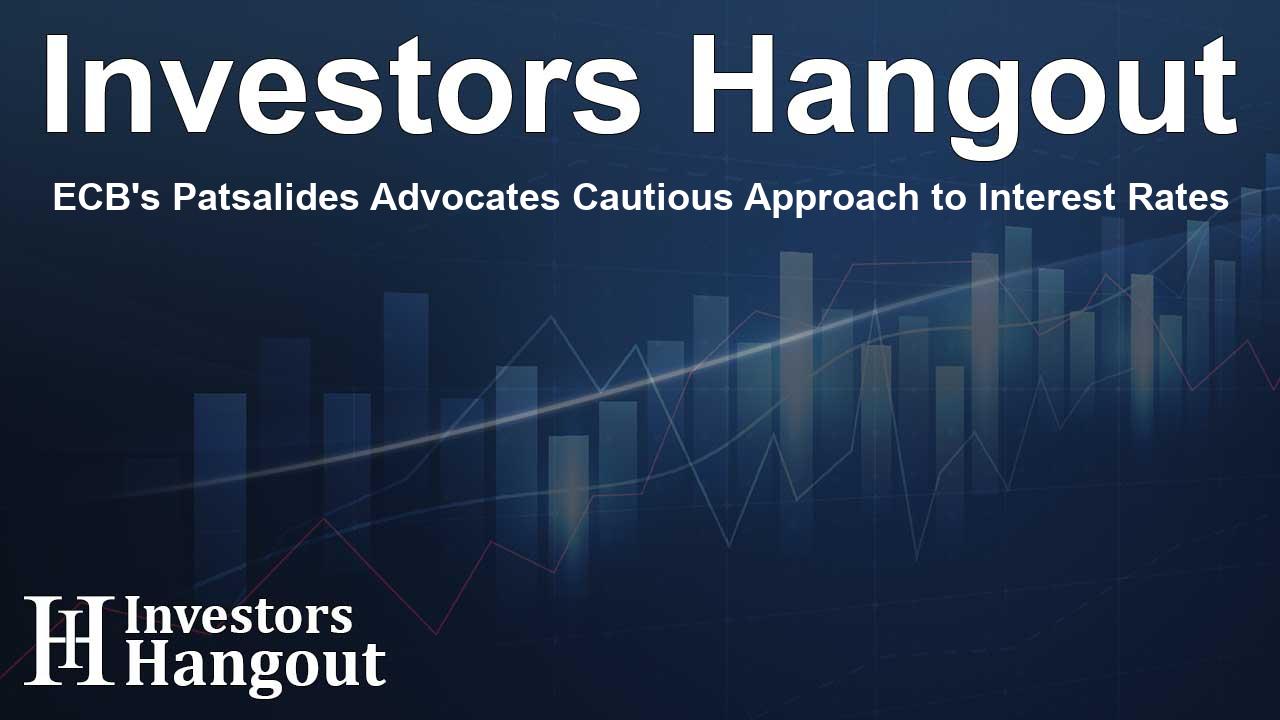ECB's Patsalides Advocates Cautious Approach to Interest Rates

Understanding Christodoulos Patsalides' Views on Interest Rates
Recent commentary by Christodoulos Patsalides, a member of the European Central Bank (ECB), has sparked discussions about the future direction of interest rates in the eurozone. He emphasizes a gradual approach to adjusting interest rates, advocating for small, measured cuts instead of significant reductions that might stimulate economic growth. This viewpoint comes at a time when the ECB is contemplating how to respond to continued low growth rates and an easing inflation crisis.
The Rationale Behind a Gradual Approach
Patsalides believes that the ECB should remain vigilant and cautious when making policy adjustments. He underlines the need to avoid causing unnecessary disturbances in the financial markets by signaling dramatic changes. Drawing on his extensive background in economics, he affirms the necessity of a balanced approach to interest rate cuts, proposing that minor adjustments will serve the economy better than abrupt alterations.
Concerns About Inflation
A key part of Patsalides' argument revolves around inflation rates and their relationship with monetary policy. He firmly states that inflation must consistently remain below the ECB's target of 2% before any drastic measures, such as larger rate cuts, are considered. He explains that for significant rate changes to be justifiable, there must be a durable decline in inflation projections that warrants such actions.
The Importance of the Neutral Rate
Central to Patsalides' discourse is the concept of the neutral rate, an economic benchmark where monetary policy neither stimulates nor hinders growth. He estimates that the neutral rate lies between 1.5% and 3%, suggesting the ECB's current deposit rate of 3% is approaching neutral territory. This notion suggests that the central bank does not need to lower rates further unless economic conditions change significantly.
Market Reactions and Forward Projections
The current market sentiment indicates expectations of continued rate cuts, with projections predicting a fall to 2% by mid-2025. However, Patsalides remains reserved about the current market pricing, asserting that predictions can sometimes miss the mark. He retains the flexibility to revise his positions should future economic indicators shift.
Impact of External Factors
External economic dynamics, such as the U.S. dollar's strength, have sparked concerns regarding their influence on eurozone inflation. Patsalides dismisses these worries, suggesting that the current exchange rate does not significantly contribute to inflationary trends in the eurozone. In discussions regarding potential tariffs under newly elected U.S. leadership, he notes that while there could be short-term inflationary effects, the long-term impacts on growth and inflation are less predictable and will largely depend on the specifics of the implemented measures.
Final Thoughts on ECB's Strategy
In conclusion, Christodoulos Patsalides' insights highlight a careful and methodical approach to monetary policy in the eurozone. By prioritizing small, controlled interest rate cuts and maintaining a stable financial environment, the ECB can navigate the current economic landscape effectively. The ECB's decisions will continue to influence various economic stakeholders in Europe and beyond, making it essential to monitor these developments closely.
Frequently Asked Questions
What is the current stance of the ECB on interest rates?
The ECB is currently focused on gradual interest rate cuts rather than significant reductions to stimulate growth.
Who is Christodoulos Patsalides?
Christodoulos Patsalides is a member of the ECB's Governing Council, with a strong background in economics.
What does the neutral rate imply for monetary policy?
The neutral rate is a level where interest rates neither stimulate nor slow growth, providing a benchmark for policy decisions.
How has inflation influenced the ECB's decisions?
Inflation rates play a critical role in determining whether the ECB will proceed with larger interest rate cuts.
What external factors are impacting the ECB's outlook?
The strength of the U.S. dollar and potential trade measures could complicate the eurozone's inflation landscape.
About The Author
Contact Hannah Lewis privately here. Or send an email with ATTN: Hannah Lewis as the subject to contact@investorshangout.com.
About Investors Hangout
Investors Hangout is a leading online stock forum for financial discussion and learning, offering a wide range of free tools and resources. It draws in traders of all levels, who exchange market knowledge, investigate trading tactics, and keep an eye on industry developments in real time. Featuring financial articles, stock message boards, quotes, charts, company profiles, and live news updates. Through cooperative learning and a wealth of informational resources, it helps users from novices creating their first portfolios to experts honing their techniques. Join Investors Hangout today: https://investorshangout.com/
The content of this article is based on factual, publicly available information and does not represent legal, financial, or investment advice. Investors Hangout does not offer financial advice, and the author is not a licensed financial advisor. Consult a qualified advisor before making any financial or investment decisions based on this article. This article should not be considered advice to purchase, sell, or hold any securities or other investments. If any of the material provided here is inaccurate, please contact us for corrections.
